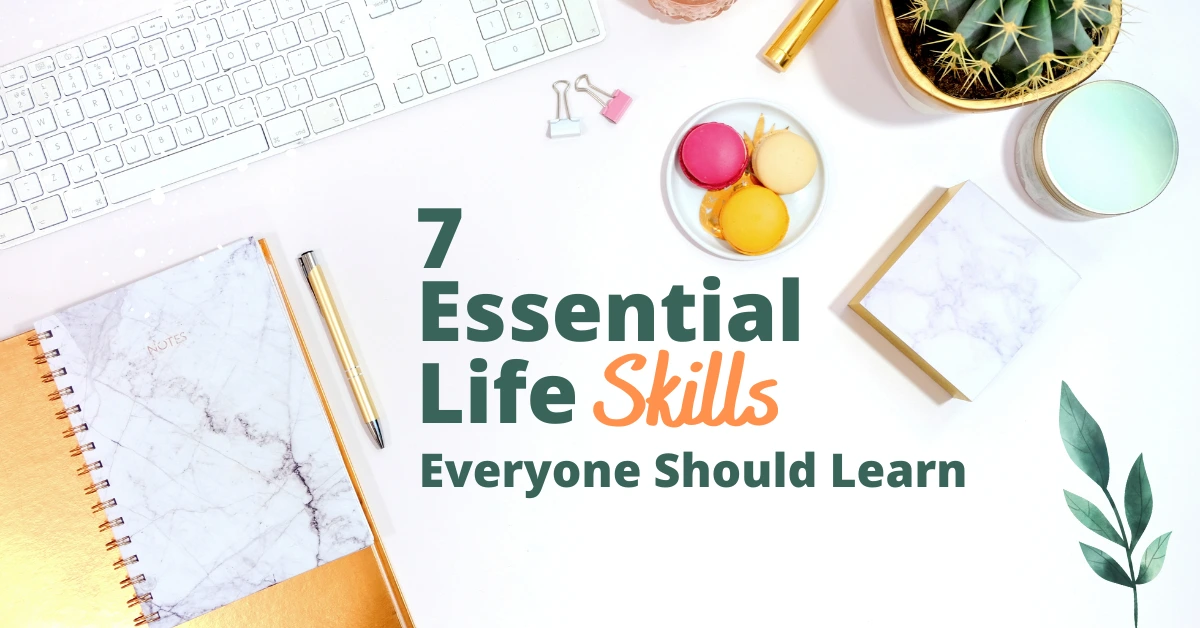
7 Essential Life Skills Everyone Should Learn
- 125
- 0
- 0
Essential life skills that everyone should acquire include effective communication, critical thinking, and problem-solving abilities. Time management is vital for balancing responsibilities, while financial literacy helps in budgeting and saving. Basic cooking skills promote health and independence, and knowing how to perform essential repairs is useful for daily living. Additionally, emotional intelligence fosters healthy relationships and self-awareness. Learning how to manage stress and maintain a positive mindset is crucial for overall well-being. Finally, being adaptable to change and having a growth mindset can empower individuals to navigate life’s challenges successfully. These essential life skills everyone should learn contribute significantly to personal and professional success.
7 Essential Life Skills Everyone Should Learn
Life is full of challenges and opportunities. To make the most of it, certain skills can help. In this blog post, we’ll talk about 7 essential life skills everyone should learn and that is useful, no matter your age or background. These skills can make your life easier, help you succeed, and even make you happier. Let’s take a look at each one.
Money Management

Budgeting
A budget is a plan for your money. It helps you know how much you’re earning and spending. To make a budget:
- Record the amount of money you earn each month.
- List all your expenses (like rent, food, bills)
- Compare your income and expenses
- Look for ways to spend less or earn more if needed
Saving
Saving money is important. It helps you prepare for unexpected expenses and plan for big purchases. Here are some saving tips:
- Try to save a little bit of money from each paycheck
- Set up a separate savings account
- Begin with manageable goals, such as saving ₹500/1000 each month.
- Increase your savings as you can
Understanding Credit
Credit can be helpful, but it can also cause problems if not used wisely. Learn about:
- How credit cards work
- The importance of paying bills on time
- What is the meaning of a credit score and why it matters
- The real cost of loans and credit card debt
Planning for the Future
Think about your long-term money goals. This might include:
- Saving for retirement
- Planning for big expenses (like buying a house or car)
- Establishing an emergency fund for unforeseen expenses.
- Learning about different types of investments
Remember, good money management takes practice. Begin with minor actions and continue gaining knowledge.
Communication Skills
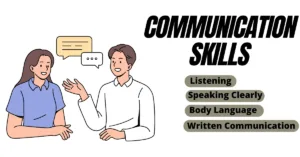
Being able to communicate well is important in all areas of life. It helps in your job, your relationships, and in everyday situations. This is how you can enhance your communication abilities:
Listening
Good communication starts with good listening. To be a better listener:
- Pay full attention when someone is talking
- Don’t interrupt
- Ask questions to make sure you understand
- Show you’re listening with nods or small comments
Speaking Clearly
When it’s your turn to talk:
- Consider your message carefully before speaking.
- Speak slowly and clearly
- Use simple words and short sentences
- Check that the other person understands you
Body Language
Your body “talks” too. Pay attention to:
- Your facial expressions
- Your posture
- Eye contact
- Hand gestures
Written Communication
In today’s world, a lot of communication happens in writing. To improve your written communication:
- Practice writing emails and messages
- Read what you’ve written before sending it
- Utilize spell-check, but avoid depending on it entirely.
- Keep your writing clear and to the point
Good communication takes practice. Don’t be afraid to ask for feedback and keep working on it.
Time Management
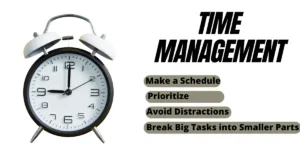
Effectively managing your time can increase your productivity and reduce stress levels. Here are some suggestions for improving time management:
Make a Schedule
- Use a calendar or planner to keep track of your tasks and events
- Write down deadlines for work or school
- Include time for things you enjoy, not just work
Prioritize
Not all tasks are equally important. Learn to:
- Decide which tasks are most important
- Do the most important things first
- It’s perfectly fine to decline less significant requests.
Avoid Distractions
It’s easy to get distracted. Try to:
- Disable phone notifications while you’re working.
- If possible, choose a peaceful location to work.
- Take short breaks to help you focus better.
Break Big Tasks into Smaller Parts
If you have a significant task to complete:
- Divide it into smaller, easier tasks
- Set deadlines for each small task
- Tackle one part at a time
Remember, good time management is a skill. Improvement requires consistent practice.
Problem-Solving

Life is full of problems, big and small. Good problem-solving skills can help you handle them. Here’s a step-by-step approach to problem-solving:
Identify the Problem
- What exactly is the issue?
- Why is it a problem?
Gather Information
- What do you know about the problem?
- What more do you need to find out?
Think of Possible Solutions
- Generate various solutions to the problem.
- Avoid evaluating your ideas at this stage; simply write them down.
Evaluate Your Options
- What are the pros and cons of each option?
- Which solution seems best?
Choose a Solution and Act
- Pick the best option
- Develop a strategy to implement your solution effectively.
Check the Results
- Did your solution work?
- If not, try another option or start the process again.
Problem-solving skills improve with practice. Don’t get discouraged if you don’t solve every problem perfectly. Each attempt helps you learn and get better.
Emotional Intelligence
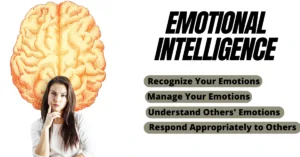
Emotional intelligence is about understanding and managing your own emotions and being able to understand and respond to others’ emotions. It’s a key skill for good relationships and mental health. Here are some ways to enhance your emotional intelligence:
Recognize Your Emotions
- Stay aware of your feelings as the day progresses.
- Try to name your emotions (Are you happy? Sad? Angry? Excited?)
- Notice what situations cause different emotions
Manage Your Emotions
- Find healthy ways to deal with difficult emotions (like taking deep breaths when you’re angry)
- Learn what helps you calm down when you’re upset
- Practice positive self-talk
Understand Others’ Emotions
- Watch for clues in others’ facial expressions and body language
- Pay close attention to both the content and tone of what others express.
- Try to put yourself in others’ shoes.
Respond Appropriately to Others
- Show empathy when others are upset
- Offer help or support when needed
- Be patient with others’ emotions
Improving emotional intelligence takes time and practice. Exercise patience with yourself during the learning process.
Critical Thinking
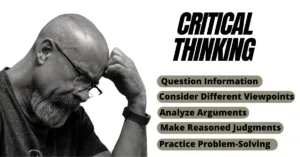
Critical thinking means thinking clearly and rationally about what to believe or do. It’s an important skill in work, study, and everyday life. Here’s how to improve your critical thinking:
Question Information
- Don’t believe everything you hear or read
- Ask where information comes from
- Look for evidence to support claims
Consider Different Viewpoints
- Try to see issues from different angles
- Listen to opinions that are different from yours
- Be willing to reconsider your opinions when you receive new information.
Analyze Arguments
- Look for the main points in an argument
- Check if the reasons given support the conclusion
- Look for any weaknesses in the argument
Make Reasoned Judgments
- Base your opinions on facts and logic, not just feelings
- Think about the consequences of different choices
- Be willing to admit when you’re not sure about something
Practice Problem-Solving
- Use the problem-solving steps we talked about earlier
- Apply critical thinking to real-life problems
- Learn from your mistakes and successes
Remember, good critical thinking takes practice. Keep working at it, and you’ll get better over time.
Adaptability
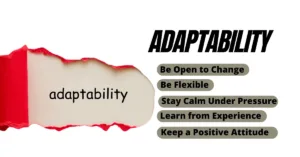
The world is always changing, and being able to adapt is important. Adaptability means being able to adjust to new conditions or situations. Here’s how to become more adaptable:
Be Open to Change
- Try to see change as an opportunity, not just a problem
- Be willing to try new things
- Stay curious and keep learning
Be Flexible
- Have a Plan B (and maybe a Plan C) for important things
- Be ready to change your plans if needed
- Don’t get too attached to doing things one way
Stay Calm Under Pressure
- Practice staying calm when things don’t go as planned
- Take deep breaths to help you relax
- Remember that most problems have solutions
Learn from Experience
- Reflect on how you have dealt with changes previously.
- What worked well? What didn’t?
- Use these lessons to help you with future changes.
Keep a Positive Attitude
- Try to find the good in new situations
- Focus on what you can control
- Remember that adapting to change helps you grow
Adaptability is a skill that gets better with practice. The more you work on it, the easier it becomes to handle changes and new situations.
Conclusion
These seven skills – money management, communication, time management, problem-solving, emotional intelligence, critical thinking, and adaptability – are really important in life. They can help you in your job, in your relationships, and in dealing with everyday challenges.
Remember, no one is born knowing all these skills. They take time and practice to develop. Don’t worry if you’re not great at all of them right away. The important thing is to keep learning and trying to improve. Even minor actions can lead to significant changes over time.
Start by picking one skill to work on. Set small, achievable goals for yourself. As you get better at one skill, you can start working on others. Before you know it, you’ll be handling life’s challenges with more confidence and success. Keep learning, keep practicing, and don’t be afraid to ask for help when you need it. Good luck on your journey to learning these essential life skills.
FAQs
1. What are life skills?
Life skills are abilities that help you deal with everyday challenges. They include communication, problem-solving, time management, and financial literacy, which are important for personal and professional success.
2. Why are life skills important?
Life skills are crucial because they enable you to manage daily tasks effectively. They help you make better decisions, communicate well, and handle stress, leading to a more balanced and fulfilling life.
3. How can I improve my communication skills?
To enhance your communication skills, practice active listening, express your thoughts clearly, and engage in conversations. Joining public speaking groups or taking courses can also boost your confidence in speaking.
4. What is financial literacy, and why do I need it?
Financial literacy means understanding how to manage money, including budgeting, saving, and investing. It is essential for making informed financial decisions and achieving your financial goals throughout life.
5. How can I develop emotional intelligence?
You can develop emotional intelligence by being aware of your feelings, practicing empathy towards others, and improving your relationships. Reflecting on your emotions and seeking feedback can also enhance your emotional skills.
Also Read:
The Benefits of Meditation and Mindfulness
References:
https://www.ncbi.nlm.nih.gov/pmc/articles/PMC10325125/
https://www.ncbi.nlm.nih.gov/pmc/articles/PMC3025161/
https://en.wikipedia.org/wiki/Life_skills
Disclaimer: The information provided in this blog on essential life skills is for general guidance only. Individual experiences may vary. For tailored advice and training, please consult a qualified educator or life skills coach.
Related post

7 Health Benefits of Assam Tea


